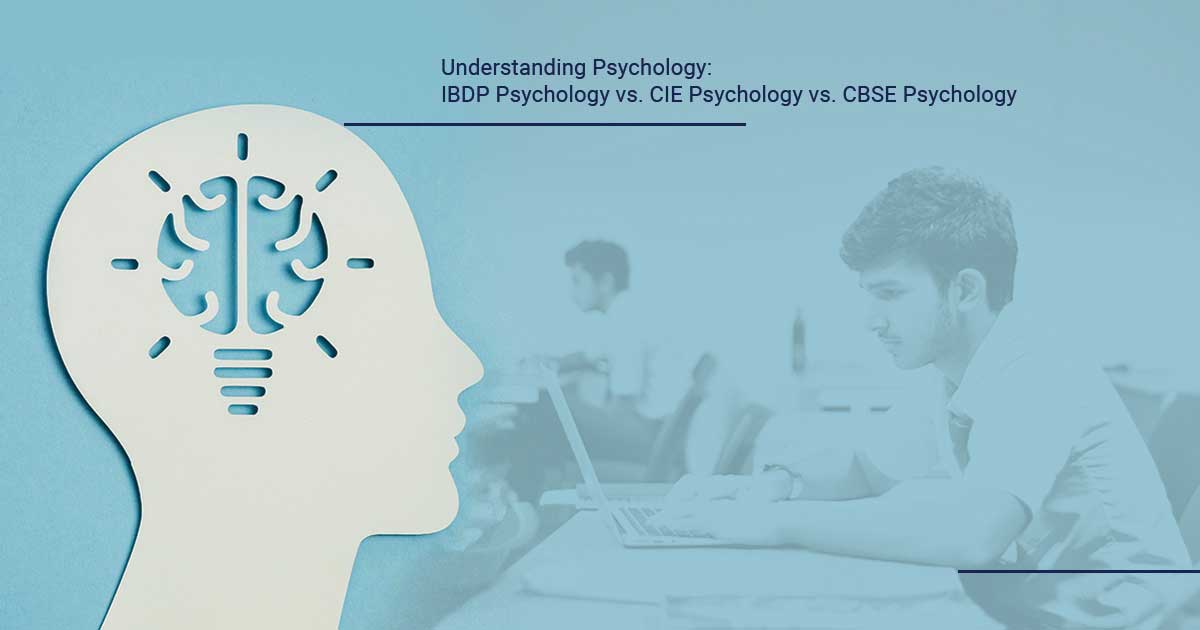

Choosing a psychology course is a crucial decision that shapes a student’s academic journey and potentially influences future career paths. The International Baccalaureate Diploma Programme (IBDP), Cambridge International Examinations (CIE), and the Central Board of Secondary Education (CBSE) each offer unique perspectives on psychology education. As the field of psychology continues to evolve, the skills and knowledge gained from these programs can be instrumental in addressing the diverse challenges of the human psyche.
The IBDP is renowned for its holistic and international approach to education and reflects a global perspective on human behaviour and cognition. It enables students to think critically, analyse research, and investigate independently. One distinct feature of IBDP Psychology is the emphasis on a holistic view of the human mind and behaviour. The course has two main components: SL (Standard Level) and HL (Higher Level). While SL covers the core topics, HL delves deeper into additional areas, providing students with a more comprehensive understanding.
CIE Psychology takes a research-oriented and comprehensive approach to studying human behaviour. The curriculum is designed to foster critical thinking, research skills, and an understanding of the ethical considerations involved in psychological research. CIE Psychology comprises two main components: AS Level and A Level. AS Level introduces fundamental concepts, and A Level delves deeper into specific areas of psychology.
CBSE, a prominent education board in India, offers a psychology course that combines theoretical knowledge with practical applications. CBSE Psychology aims to provide a strong foundation in the fundamentals of psychology, catering to students who may pursue higher education in diverse fields. CBSE Psychology focuses on building a conceptual understanding of psychological theories and their practical implications.
Course Duration:
The IBDP typically spans two years, covering the final years of high school. The psychology course is integrated into the broader IBDP curriculum, and students can take either Standard Level (SL) or Higher Level (HL) psychology. The SL course usually requires 150 hours of teaching time, while the HL course demands additional hours for a more in-depth study.
CIE also offers a two-tiered system, with an Advanced Subsidiary (AS) Level and an A Level. The AS Level is a one-year course, and students can continue to the A Level, extending the program to two years. The A Level builds upon the foundations laid in the AS Level, allowing for a more comprehensive exploration of psychology concepts.
As a national board in India, CBSE Programme follows a two-year course structure for senior secondary education. The psychology curriculum is part of this two-year program, with students typically taking the psychology examination at the end of their senior secondary education.
Curriculum:
The IBDP Psychology curriculum is designed to provide a holistic understanding of psychology. SL and HL courses include core topics, but HL goes further. A distinctive feature is the inclusion of internal assessments, where students conduct their research projects, fostering independent inquiry and critical thinking. It covers various topics, including:
CIE Psychology is known for its research-oriented approach. The AS Level introduces fundamental concepts, and the A Level delves deeper into specific areas of psychology, such as abnormal psychology and the psychology of human relationships. Coursework forms a significant part of the assessment, allowing students to engage in practical research and apply psychological theories to real-world scenarios. The curriculum often includes:
CBSE Psychology focuses on providing a solid foundation in psychological theories and principles. While it includes practical applications, the emphasis is on theoretical understanding. Assessments are primarily through written examinations, with a separate practical examination component. The curriculum covers various units: intelligence, personality, and mental health, and following major units:
Career Opportunities:
The IBDP is widely recognised globally, and completing the psychology course can open doors to admission in international universities. The emphasis on critical thinking, research skills, and independent inquiry prepares students for diverse career paths. Graduates may pursue careers such as:
With its research-oriented focus, CIE Psychology prepares students for academic, research, and applied psychology careers. The international recognition of CIE qualifications enhances the mobility of students across global educational landscapes. Graduates may pursue advanced degrees in psychology or find opportunities such as:
CBSE Psychology provides a solid foundation for students aspiring to pursue psychology at the undergraduate level. It is particularly well-suited for those planning to study psychology within the Indian education system. Career prospects include pursuing specialised areas within psychology, or roles such as:
The diverse IBDP, CIE, and CBSE Psychology approaches provide students with unique opportunities to explore the fascinating realm of human behaviour and cognition. Individual preferences, career goals, and the desired educational experience should guide the choice between IBDP Psychology, CIE Psychology, and CBSE Psychology.
Recent Blogs
IGCSE Full Form
What is the International Baccalaureate?
IBDP Full Form
CIE Board Full Form
CBSE Full Form
Site Designed and Maintained By : Office of Communications, JAIN Group All rights reserved.